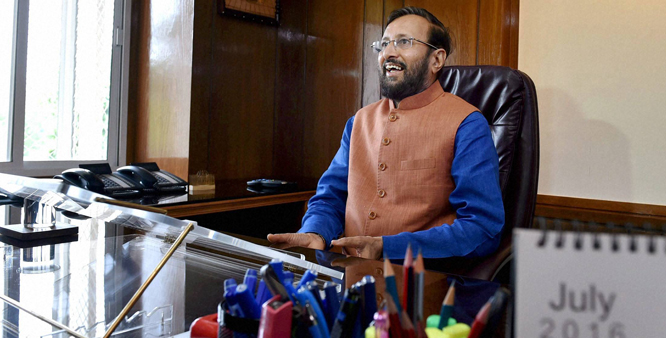The Modi government has been projected as a one-man show by several opponents and mainstream media outlets. There has been a constant attempt to show that things are driven solely by Prime Minister Modi’s charisma. However, the ground reality is completely different. The fact remains that the Modi cabinet consists of a set of efficient and high performing ministers who have delivered on their promises. Rapid economic growth under the Modi government can be attributed to high standards that have been set in their respective fields by ministers like Sushma Swaraj, Piyush Goel, Suresh Prabhu, Gadkari and Sitharaman. These are just a few examples of how the Modi government boasts of a number of stalwarts.
Another addition to the Modi government’s list of efficient ministers bringing a turnaround in India’s growth story is Union minister for Human Resource Development Prakash Javadekar. The manner in which he is bringing the much needed reforms to the functioning of universities is highly commendable. From piloting the IIT-IIM Autonomy Bill and the Institution of Eminence Bill to granting autonomy to 60 institutes from UGC control, Javadekar is taking all possible steps in order to ensure that Indian universities are made free from unnecessary government control.
In March this year, Javadekar had announced the UGC decision of granting autonomy to a total of 60 institutes- 52 universities and 8 colleges. It includes institutes which have maintained good academic standards going by the National Assessment and Accreditation Council (NAAC) score or any other corresponding score from any reputed accreditation agency, or reputed world rankings. This is a landmark decision and must be seen as an attempt by the government to grant relative freedom to these institutes in their quest for excellence. This was possibly the single biggest reform in the direction of educational autonomy. Prakash Javadekar had then stated that the government was striving to introduce a liberalised regime in the education sector and was focusing on autonomy as a yardstick for quality education. He cleared the air around this move and stressed on what this attempt at unshackling the Indian universities from state control means. He said, “Although these universities will remain within the UGC’s ambit, they will have the freedom to launch new courses, off-campus centres, skill development courses, research parks and new academic programmes. They will also have the freedom to hire foreign faculty members, enroll foreign students, give incentive-based emoluments to faculty members, enter into academic collaborations and run open-distance learning programmes.”
Dismissing baseless concerns around this move by the government, Javadekar made it clear that granting autonomy is in no way tantamount to privatisation. He made it clear that just because autonomy had been granted to 60 institutions including 21 state universities and 5 central universities, it should not be assumed that there will be a fee hike or reduction in government grants. The government will continue to support these universities as it did before and this move will only help these institutions in improving their global standing.
The Indian education system at all levels has suffered from unnecessary state control for decades and this is for the first time that something is being done to grant them more freedom. For taking this bold step, Prakash Javadekar deserves all the credit. He is single-handedly transforming the way Indian universities work and that is praiseworthy. While challenges like reservations and minority appeasement still persist, it can still be safely said that Javadekar and the Modi government have taken a huge step in the right direction.

























